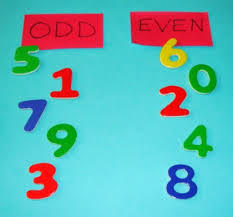Odd Or Even??
 Given that
a
and
b
are integers, what can we conclude about the expression
Given that
a
and
b
are integers, what can we conclude about the expression
( a 2 + a + 2 0 1 1 ) ( 2 b + 1 ) ?
This section requires Javascript.
You are seeing this because something didn't load right. We suggest you, (a) try
refreshing the page, (b) enabling javascript if it is disabled on your browser and,
finally, (c)
loading the
non-javascript version of this page
. We're sorry about the hassle.
6 solutions
First locate the options after that going to compute the puzzle .. U easily determine the puzzle...
a(a+1), is always even and 2011 is always odd, so the sum of the first factor is always odd.
2b + 1 is always odd. So product of two odd is always odd.
This is a very confusing question, as it asks whether values of a and b are odd or even, not whether the solution to the problem is odd or even. The values of a and b can be odd or even and the solution to the problem will always be odd. Am I wrong in stating that this question is worded improperly?
Log in to reply
'what can we conclude about the expression' clearly means what is the solution, for a and b can be odd and or even.
Log in to reply
I believe that this is a mistake in language translation. If I was to say "Based upon the expression (a²+a+2011)(2b+1), we can conclude odd for all values of a and b", I would be wrong. Coming to a conclusion isn't the same as coming to a solution. I came to the conclusion that, whether a and b are odd or even, the solution will always be odd. I can conclude multiple things from this problem, but the solution will always be odd.
but what if the value is not a whole number?
Log in to reply
Odd and even refer only to whole number !!
he says a and b are integers
a 2 and a both must be either odd or even and hence their sum is always even.
So a 2 +a+(2011, an odd number) is odd. (2b+1) is clearly odd. So multiplication of two odds is odd.
I tried substituting a/b =1 and 2, the result is odd. Since 1 and 2 represents already all odd and even number, then that would be enough.
First let's see ( a^2 + a + 2011) :
Case 1 : A is even :
a^2 will be even bcoz multiple of any even number will be even no matter how many times it is multiplied...
So a^2 + a + 2011 will be odd ...........( Since a^2 and a are even)
Case 2 : a is odd:
a^2 will be odd because multiple of every odd number will be odd if it is multiplied odd-number of times.....
So a^2 + a + 2011 will again odd.............( odd+odd+odd =odd)
From case 1 &2 : a^2+a +2011 is odd for all values of a........(1)
Now let's see (2b+1):
Case1: b is even:
2b will be EVEN.....(Since twice of any number is even)
So, 2b + 1 will be odd
Case 2: b is odd
2b will again be even ......(same reason as above)
Again 2b + 1 will be odd
From case 1 and 2: 2b +1 is odd for any value of b........(2)
Now (a^2 + a +2011) × (2b +1) can be written as :
Odd ×Odd ; which will be a odd number since multiple of any odd number will be odd if multiplied odd-numbers of time
So (a^2 + a+2011) × (2b+1) will be odd for any values of a and b . 😉
[ (2n + 1 )^2 + ( 2n + 1 ) + 2011 ] * ( 2b + 1 )
= (4n^2 + 6n + 2013 ) ( 2b + 1 )
= odd
[ (2n)^2 + 2n + 2011 ] * ( 2b + 1 )
= odd
Just pick small value numbers and try them on. A=1 and B=2 for example. Replace them and solve. Solve them 3 times and you´ll know that the result is always odd no matter what.
Can we conclude from a few results ? Even from lots of results ??
Just pick two elements from odd integers for a&b and check the results. Same goes for even integers, and odd & even, even & odd, for a and b respectively. All results are elements of odd integers. :)
Can we conclude from a few results ? Even from lots of results ??
Log in to reply
Well, not all can be concluded from a few results, but in this case, there is uniformity. If you square an odd, results are odd; if you square an even, results are even; if you add odd to even, results are odd, (and vice versa); if you add both odd, results are even; and if you add both even, results are even. It is also true in the given expression since the operators are the same in the examples.
a 2 + a = a ( a + 1 ) which is even for all values of a.
so, ( a 2 + a + 2 0 1 1 ) is odd for all values of a.
Now, 2 b + 1 = b + b + 1 which is odd for all values of b.
∴ ( a 2 + a + 2 0 1 1 ) ( 2 b + 1 ) is odd for all values of a and b.